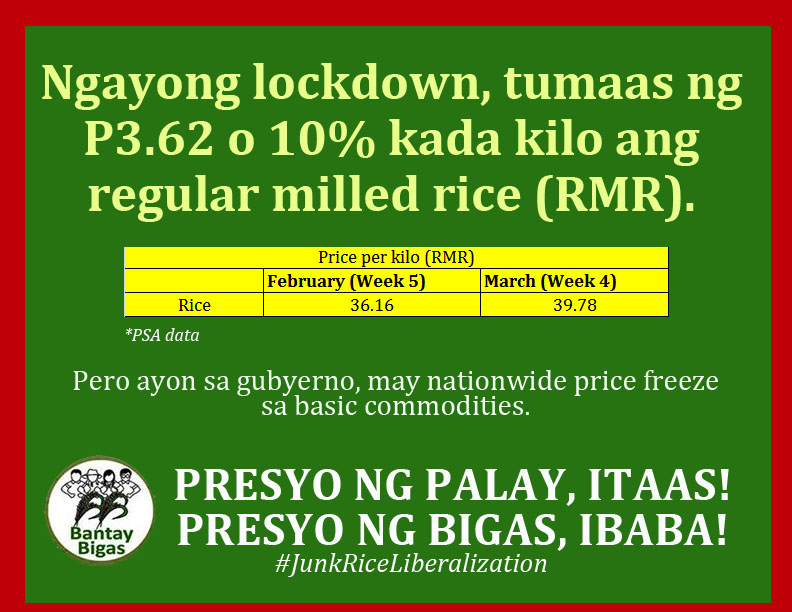Manila, Philippines – As the poor consumers continue to suffer from the impact of the lockdown supposedly as response to the COVID-19 pandemic, prices of commercial rice in the market increased from pre-lockdown month of February to March. Data from the Philippine Statisctics Authority (PSA) showed that prices of regular milled rice rose by P3.62 or 10% from P36.16 to P39.78 per kilo. At the Mega Q-mart public market in Quezon City, prices of regular rice was already at P40 per kilo. The Bantay Bigas rice watch group and Amihan National Federation of Peasant Women called out the Duterte government to urgently act to arrest the increase into full-blown price shock.
“Price shocks are commonly expected from a declaration such as the lockdown, and with foreign countries tend to secure their own stock for their own population. The Duterte government is obviously failed to uphold food security of the people, especially when farmers are being barred or limited into working into their lands, deliveries of rice from the provinces to Metro Manila are being blocked by checkpoints, and most of all, poor consumers actually have zero purchasing power to buy rice, when majority are actually ‘no work, no pay’ workers,” Cathy Estavillo, Bantay Bigas spokesperon and Secretary-General of Amihan, said in a press statement.
She added that increased prices of rice would further throw poor consumers into indebtedness and hunger, moreover, this would also affect relief efforts for affected sectors. She also called out the government to seriously carry out its price freeze order, especially for rice. Memorandum Circular 77 was issued by President Rodrigo Duterte on March 17, directing the Department of Agriculture to freeze prices of agricultural products, as sanctioned by the Republic Act 7581 Price Act and various declarations of public emergencies.
“Duterte has already issued the state of public health emergency, calamity, the Memorandum Circular 77 or price freeze on essential items, but we are being hammered by price increases. We challenge the government to control the prices of rice and pull it down to P25 per kilo, to make it accessible to affected poor consumers, who mostly lost their sources of livelihood and household incomes. If Duterte could control the mobility of the people, more so the prices of rice,” she dared.
Moreover, she pushed for intensified relief distribution of rice stocks of the National Food Authority (NFA) to poor sectors affected by the lockdown. She also urged for the total scrapping of the Republic Act 11203 Rice Liberalization Law, as it has shown its total failure this situation of the pandemic. Vietnam, one of the main origin of the country’s rice importation has already announced its suspension of exports, which is also complicated by the China’s control of at least 11 mega-dams at the upper basin of the Mekong river triggering drought over Southeast Asian countries’ rice lands. Also, the groups raised the alarm against the decrease in farm gate prices of rice in Nueva Ecija, that fell by P0.50 per kilo, from P18 to P17.50 per kilo.
“More people are demanding rice, but farm gate prices are falling due to the mere government drumming up of importing 300,000 metric tons. The law itself is destructive this time of pandemic, when we should all be supporting our food security frontliners, and not subject them to profiteering and exploitation. RA 11203 should be urgently scrapped, it is totally useless and detrimental,” she said.
She called for adequate support to rice farmers as “food security frontliners” who are the real agents of food security, self-sufficiency and self-reliance in the country. ###

